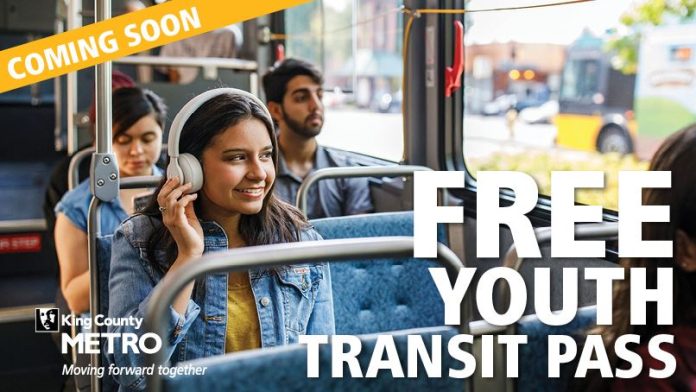This week, more zero youth fare programs got approval in Puget Sound. Add King County Metro and Sound Transit to the list where youth riders aged 18 and under will be able to ride all forms of transit on their systems (i.e., bus, ferry, streetcar, light rail, and commuter rail) free of charge. The new policies will save youth riders $1.50 per trip across most services (savings will be even more on the Metro’s paratransit and King County Water Taxi services) and go into effect just in time for the new school year.
Metro and Sound Transit agencies are still coordinating implementation of a regional strategy for the free youth fare program. Youth riders will be issued ORCA youth transit passes, if they don’t already have them, for use on transit. Youth that don’t have a ORCA youth transit pass may be asked to show some sort of age identification, such as a school-issued student pass. However, youth riders won’t be denied access to transit if they don’t have valid fare media. Agencies will be doing outreach to youth to educate them about the new program.
There are mixed financial implications to implementing the zero fare program.
For Metro, it’s a positive impact with the agency slated to receive $37.1 million per year in state grants for implementing its program. That’s more than the $10 million it currently collects in youth fares.
Conversely for Sound Transit, it’s a negative impact in quite a meaningful way. This is because the state legislature barred the agency from receiving any state grants to cover implementation costs — much like it does for most transit funding programs. Absent a change of heart by the state legislature, Sound Transit is estimated to lose out on $148 million in revenue from zero youth fares through 2046. Sound Transit could have maintained youth fares, but it would have made a regional strategy to zero youth fares messy. The agency provides critical regional service across jurisdictional transit boundaries and often forms the backbone of local transit networks in communities.
The foregone youth fares will affect Sound Transit’s projected remaining debt capacity by 0.7% in what’s considered the minimum year (2042) to 6.0%. Just a year ago, the agency had 15.8% remaining debt capacity in the minimum year. That had evaporated to 6.7% by spring, so this latest action brings Sound Transit ever closer to no remaining debt capacity in the minimum year. If the debt capacity goes negative, it will make execution of the agency’s financial plan increasingly difficult and could mean, among other things, needing to further delay and pare back costs to baseline Sound Transit 3 expansion projects.
Nevertheless, Kent Keel who is chair of the Sound Transit board supported the policy change. “Today’s decision will not only increase affordability for youth and families, but it will increase their opportunities as well,” he said in a statement. “Free fares mean easy access not just to schools, but to jobs, after-school activities and youth-related programs. It also introduces a new generation to the habit of a becoming lifetime riders of transit.”
Metro and Sound Transit will implement their zero youth fare programs on September 1st, which aligns with several other agencies. Among them are Community Transit, Pierce Transit, Kitsap Transit, and Washington State Ferries. Everett Transit already implemented its program at the beginning of July.
Stephen is a professional urban planner in Puget Sound with a passion for sustainable, livable, and diverse cities. He is especially interested in how policies, regulations, and programs can promote positive outcomes for communities. With stints in great cities like Bellingham and Cork, Stephen currently lives in Seattle. He primarily covers land use and transportation issues and has been with The Urbanist since 2014.



